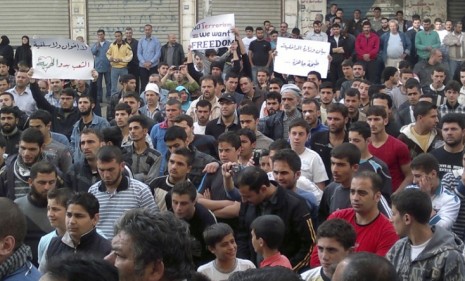'Great Friday': Is Syria on the brink of revolution?
As a day of reckoning approaches, the country's embattled government desperately clings to power

A free daily email with the biggest news stories of the day – and the best features from TheWeek.com
You are now subscribed
Your newsletter sign-up was successful
Syrian protesters have been violently clashing with government forces for the last five weeks, with more than 200 deaths confirmed. Following the lead of their Tunisian and Egyptian counterparts, Syrians are demanding that the country's repressive Baath regime, which has ruled since 1963, grant its citizens basic civil rights. President Bashar al-Assad dropped a much-hated 48-year-old emergency law earlier this week, but increasingly angry protesters demand nothing less than his ouster. Now, the demonstrators are set for their biggest protest yet — dubbed "Great Friday" — which could be "potentially decisive for the uprising’s momentum," says Anthony Shadid at The New York Times. Here, a brief guide to the conflict:
Did lifting the emergency law change anything?
It certainly didn't change everything. Many of the laws used as justfiication to imprison citizens are still intact. Plus, "the security services are above the law," says Haithem Maleh, a human rights campaigner, as quoted by Al Jazeera. Indeed, the government arrested popular opposition figure Mahmoud Issa at a large gathering in the city of Homs just hours after dropping the emergency law.
The Week
Escape your echo chamber. Get the facts behind the news, plus analysis from multiple perspectives.

Sign up for The Week's Free Newsletters
From our morning news briefing to a weekly Good News Newsletter, get the best of The Week delivered directly to your inbox.
From our morning news briefing to a weekly Good News Newsletter, get the best of The Week delivered directly to your inbox.
How tenuous is the regime's grip on power?
At the beginning of the uprising, many Syrians would probably have been satisfied with Assad's lifting of the emergency law. But the autocrat's brutal response to protests has helped foster a more revolutionary spirit. "I used to be more careful with my predictions," says Rime Allaf a Syrian political analayst at London's Chatham House, as quoted by The Christian Science Monitor. But right now, "people are infuriated by the killings that the regime has done over the past few days. The mood is very defiant."
What should we expect Friday?
Great Friday "may serve as a referendum of sorts" on the Assad strategy of repealing the emergency law, says Anthony Shadid at the Times. The Facebook group "The Syrian Revolution 2011," which is advertising the Friday event, has more than 120,000 fans. And protesters seem confident about the demonstration's prospects. "It’s O.K., don’t worry, we will finish it on Friday," Syrians were said to chant at slain protesters' funerals on Wednesday.
A free daily email with the biggest news stories of the day – and the best features from TheWeek.com
So will Assad survive?
That's anybody's guess. But at least one former government official thinks he's about to follow in Hosni Mubarak's footsteps. "The depth of the rift between the regime and the majority of the people... will lead to the collapse of a regime desperately struggling to survive," says exiled former Vice President Abdelhalim Khaddam.
What would happen to Syria if Assad leaves?
That's even more unclear. While getting rid of the government may be the only thing that will please protesters, observers fear a chaotic post-revolution aftermath. With its potentially explosive mix of minorities (Christians, Sunni Muslims, Kurds, and more), and lack of established political institutions, Syria could be ripe for internecine conflict and score-settling after the fall of a long-established regime.
Sources: New York Times, Christian Science Monitor, Al Jazeera, Reuters, Yalibnan
-
 Is Andrew’s arrest the end for the monarchy?
Is Andrew’s arrest the end for the monarchy?Today's Big Question The King has distanced the Royal Family from his disgraced brother but a ‘fit of revolutionary disgust’ could still wipe them out
-
 Quiz of The Week: 14 – 20 February
Quiz of The Week: 14 – 20 FebruaryQuiz Have you been paying attention to The Week’s news?
-
 The Week Unwrapped: Do the Freemasons have too much sway in the police force?
The Week Unwrapped: Do the Freemasons have too much sway in the police force?Podcast Plus, what does the growing popularity of prediction markets mean for the future? And why are UK film and TV workers struggling?